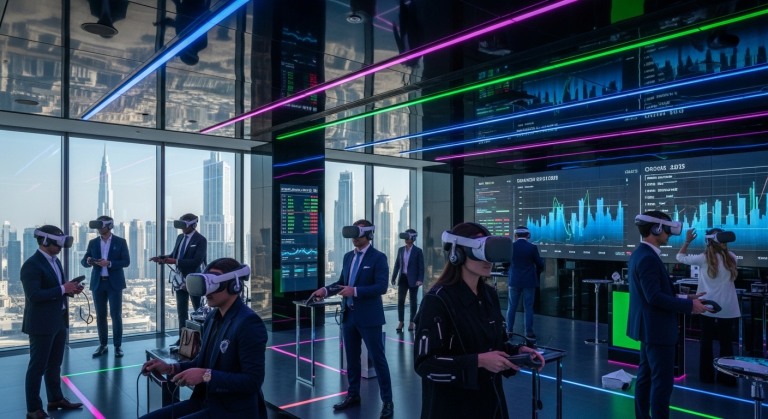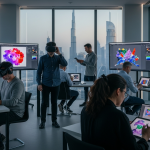Market Analysis and Opportunities
Dubai is recognized as a global hub for technology, entertainment, and tourism, making it an ideal location for launching a Virtual Reality (VR) experience center. The United Arab Emirates (UAE), and particularly Dubai, has demonstrated a strong appetite for immersive and next-generation entertainment options, supported by a young population, digital transformation initiatives, and increasing visitor numbers.
Target Market Analysis
– The UAE’s entertainment and leisure market is projected to surpass AED 45 billion by 2030, with immersive experience centers representing a rapidly growing niche (source: UAE Ministry of Economy).
– Dubai’s population is characterized by youthfulness—over 30% are under 35—and high digital literacy, driving demand for technology-driven experiences.
– Annual tourism arrivals in Dubai exceeded 14.3 million in 2022 (source: Dubai Tourism), providing a constant influx of visitors seeking premium and unique entertainment.
– According to Research and Markets, the Middle East and Africa VR market is expected to register a CAGR of 34% from 2023 to 2028, with the UAE leading VR adoption in the GCC.
Consumer Behavior and Trends
– Both residents and tourists are seeking novel, family-friendly attractions, including team-building, edutainment, and immersive gaming.
– There is increasing corporate interest in VR for team events, training, and brand activations.
– Sustainability, digital transformation, and the integration of AI/AR are dominant trends; customers expect hygienic, innovative, and socially shareable experiences.
Marketing Needs and Recommendations
– Initial market research is crucial to segment customers (families, gamers, corporates, tourists), shape offerings, and determine ideal price points.
– Strong digital marketing is imperative: investments in SEO, pay-per-click (PPC), engaging social media content, influencer partnerships, and localized campaigns will raise awareness among Dubai’s tech-savvy audience.
– Innovative branding strategies, such as VR previews via mobile, virtual tours on websites, or influencer-hosted launch events, can boost visibility.
– Integration with major tourism platforms, ticketing partners, and corporate agencies extends reach regionally.
Expansion Potential
– The business can expand into other high-traffic emirates (Abu Dhabi, Sharjah) and the GCC (Saudi Arabia, Qatar), targeting malls, hotels, and tourist hotspots.
– Diversification into B2B services—corporate training, virtual events, and educational workshops—unlocks new revenue streams.
– Exporting premium VR experiences or licensing proprietary content to international markets is feasible, leveraging Dubai’s global connectivity.
Comprehensive Business Overview
A VR experience center provides visitors with access to world-class virtual reality attractions—ranging from gaming, sensory museum installations, simulations, to team-building exercises. This business operates within the intersection of entertainment, technology, education, and tourism.
Business Model and Operational Scope
– Revenue is generated via ticket sales, packages for families/corporate groups, membership programs, retail (merchandise, food/beverage), and event rental.
– Target audience includes young adults, families, tourists, business groups, schools, and tech enthusiasts.
– The operational footprint spans premium retail zones, malls, or tourist districts in Dubai, focusing on high footfall and accessibility.
– The business is suited for a startup or expansion/growth stage and would benefit from placement in a Dubai Free Zone for 100% ownership, tax benefits, and streamlined licensing.
Mission, Vision, and Core Objectives
– Mission: To deliver transformative, memorable, and safe VR experiences that expand the boundaries of imagination for residents and visitors in Dubai.
– Vision: To be the leading provider of innovative VR entertainment in the UAE and a benchmark for immersive leisure in the region.
– Core Objectives: Establish a flagship VR center in Dubai, achieve robust market penetration within two years, and become a recognized partner for B2B and educational VR solutions.
Competitive Advantage
Unique Value Proposition (UVP) and Key Strengths
- Entrepreneur Perspective: The VR experience center is a high-potential business leveraging Dubai’s status as an entertainment and tourism leader, with low direct competition, high margins from premium offerings, and first-mover advantage in curated VR experiences.
- Investor Perspective: This sector offers strong scalability, beneficial ROI potential due to high footfall, and opportunities for recurring revenue through memberships or partnerships. The increasing integration of VR in entertainment (global market projected at USD 92 billion by 2027) makes this a future-proof investment.
- Manager Perspective: The operational model can maximize space utilization, introduce efficient ticketing/CRM, and integrate data analytics to tailor offerings and optimize scheduling, ensuring cost controls and customer satisfaction.
– Example: A VR center could secure exclusive partnerships with global VR content creators, host branded experiences, or deploy proprietary interactive games, cementing brand loyalty and differentiation.
Financial and Investment Needs
Financial Requirements and Cost Breakdown
Launching a VR experience center in Dubai requires a robust financial plan.
- Start-up/Initial Investment: AED 2.5M–5M, including:
- – Infrastructure: AED 1M–2M (fit-out, design, equipment purchase/lease)
- – Licensing/Legal: AED 100,000–350,000 (company registration, visas, insurance)
- – Staffing: AED 800,000–1.2M per annum (salaries, benefits for 10–15 staff)
- – Marketing and Branding: AED 200,000–500,000 (launch campaigns, SEO, social media, offline advertising)
- – Research & Development: AED 150,000–250,000 (content creation, software customization)
- – Contingency: AED 300,000–500,000
Investment Potential
– High recurring revenue from memberships and repeat visits.
– Scalable model: additional branches, franchising in the GCC, or offering white-label solutions.
– Attractive to venture capitalists and angel investors seeking technology and entertainment sectors.
– Hybrid investment models are possible: equity injection for rapid scaling, convertible debt, or partnerships with corporate clients.
Financial Risks and Mitigation
- Risks: High upfront investment, variable footfall (seasonal/tourism patterns), exchange rate fluctuations for imported equipment, and cash flow gaps in early stages.
- Mitigation Strategies: Establish diversified packages, prepaid memberships, strategic corporate/event bookings, insurance on hardware, and maintain local currency reserves for operational liquidity.
Human Resources and Recruitment
Workforce Needs
– Initial team of 10–15 employees, plus part-time/seasonal staff during holidays and events.
- Required roles: VR technicians and engineers, customer service, marketing specialist, operations manager, event coordinators, and maintenance/cleaning teams.
- Critical skills: Technology operation, hospitality, multilingual communication, safety standards, digital marketing, and event management.
HR Challenges and Strategies
– Challenges: Attracting technical VR talent in a competitive UAE market, retaining hospitality and customer service staff, and ongoing training.
– Solutions: Offer competitive compensation, provide housing or transportation benefits, implement comprehensive training programs, and foster a collaborative, innovative culture.
UAE Labor Law Compliance
– Ensure strict adherence to UAE labor regulations: employment contracts, visa sponsorship, medical insurance, leave policies, and end-of-service benefits.
– Implement regular audits and consult with labor law experts to remain compliant.
Infrastructure and Operations
Infrastructure Needs
– Physical location in a high-traffic mall or entertainment district in Dubai, ideally 300–500 m².
– State-of-the-art VR hardware, motion platforms, robust connectivity (fiber internet), secure storage, F&B outlet, and essential amenities.
– Technology investment: ERP system for bookings, operational analytics, and customizable CRM.
– Consider cost-saving approaches like leasing equipment, sharing space with other attractions, or launching a pilot in a Dubai Free Zone for licensing and setup ease.
Operational Optimization
– Weaknesses: Inefficiencies in equipment turnover, downtime, or underutilized staff.
– Improvements: Implement digital inventory management, automate marketing communication (e.g., booking confirmation/reminders), and regularly cross-train staff for multiple roles.
Legal Compliance
– Register business with Dubai Department of Economic Development (DED) or relevant Free Zone authority.
– Secure all necessary entertainment, health, and safety licenses.
– Open corporate bank accounts, comply with Know Your Customer (KYC) and Anti-Money Laundering (AML) policies.
Innovation and Technology
– Invest in regular updates to VR content.
– Use AI-driven analytics to personalize customer experiences and dynamically adjust pricing/packages.
– Explore alliances with global VR software developers for content variety and competitive advantage.
Marketing and Branding Strategies
Brand Status and Positioning
– Aim for a vibrant, future-focused identity tied to Dubai’s “City of the Future” narrative.
– Leverage local design, multicultural branding, and collaborations with influencers to appeal to diverse demographics.
Marketing Channels and Opportunities
– Focus on digital: SEO-optimized website, mobile booking app, PPC campaigns, and active presence on Instagram, TikTok, Facebook.
– Strategic partnerships with hotels, tour operators, and schools to increase visitor flow.
– Attend and sponsor tech/entertainment events and expos in Dubai.
360-Degree Campaign Potential
– Launch multi-channel campaigns: VR influencer days, livestream demos, email series for members, bundled family/or corporate packages, and participation in citywide festivals.
– Track customer journey through email, re-targeting ads, and in-center feedback kiosks.
– Leverage user-generated content (social shares from the center) to amplify reach organically.
Growth and Development Potential
Growth Strategies
– Pilot programs in one location with a roadmap for expansion to multiple sites in the UAE and the wider GCC.
– Develop proprietary VR experiences to create unique IP and licensing opportunities.
– Forge alliances with educational institutions for immersive learning modules.
Networking
– Engage with government innovation agencies and tech accelerators.
– Build relationships with mall managers, tourism boards, corporate HR departments, and global VR suppliers.
– Tap into international support platforms like Persian Horizon to access a 57-country network for cross-promotion and thought leadership.
International Potential
– Dubai serves as a gateway to the Middle East and Africa, with world-class transport and logistics, allowing seamless scaling to neighboring countries.
– Future franchising or B2B licensing in Europe, Asia, and beyond is achievable once brand equity is established.
Sustainability and Innovation
– Adopt eco-friendly practices: energy-efficient VR hardware, digital ticketing, and sustainable fit-out materials.
– Integrate smart technology for resource optimization (e.g., smart lighting, HVAC).
– Align with Dubai’s Vision 2030 for sustainability and technological leadership.
Alignment with Dubai’s Market
Cultural Alignment
– Multilingual staff, culturally sensitive content, and flexible packages tailored for family, business, and tourist segments embrace Dubai’s diversity.
– Holiday-themed events and exclusive offers for major festivals (Eid, Christmas, Diwali, National Day) resonate widely.
Local Regulatory Compliance
– Secure entertainment, safety, and commercial licenses from relevant Dubai and UAE authorities.
– Implement clear consumer policies (cancellations, safety, refunds) matching local norms.
– Align tax records with federal VAT requirements.
Advantages of Dubai
– Tax-free environment for most business activities.
– Exceptional infrastructure: transport, utilities, logistics, and tourism ecosystem.
– Ready access to a global talent pool, capital, and international visitors.
– Supportive entrepreneurship and innovation environment (business setup services facilitate a smooth entry).
Local Challenges and Solutions
– Challenge: High operational costs and intense competition from other entertainment options.
– Solution: Differentiate through unique themes, constant content innovation, loyalty programs, premium service, and targeted partnerships with local brands.
– Challenge: Managing seasonality in tourist arrivals.
– Solution: Develop local customer engagement programs, off-peak pricing, and strong year-round corporate tie-ins.
Conclusion and Actionable Recommendations
Dubai represents a strategic, high-growth market for launching and developing a Virtual Reality experience center, with strong demand among residents, tourists, and corporates. Business success depends on innovative offerings, robust marketing, operational excellence, and strict compliance. Stakeholders—entrepreneurs, investors, and managers—should:
- Conduct thorough market research to tailor offerings and define pricing.
- Invest in high-impact digital marketing and strong branding.
- Mix leisure and corporate services for diversified revenue streams.
- Prioritize operational automation, talent retention, and compliance.
- Pursue partnerships, franchises, and content licensing for growth.
- Embrace sustainable practices and innovation aligned with Dubai’s vision.
For bespoke support on company setup, expansion, or investment in the UAE’s thriving entertainment sector, explore Persian Horizon’s business and investment services to accelerate your success in Dubai’s dynamic market.







